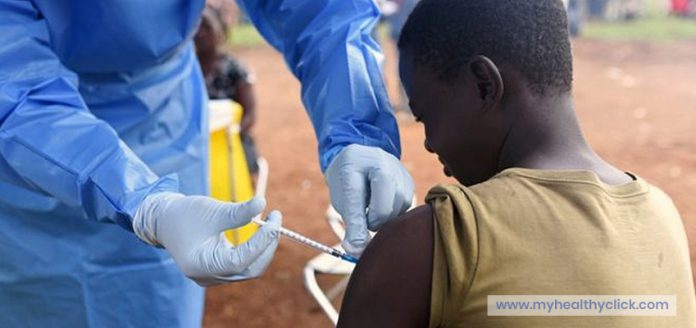According to health officials in the Democratic Republic of Congo (DRC), the number of Ebola cases recorded on a daily basis has doubled, suggesting that the outbreak may spread exponentially faster to other regions as well as other countries.
Jean-Philippe Marcoux, the country director for Mercy Corps in DRC, said, “Now it’s doubling – it’s very possible that it can double again. If we don’t significantly increase the resources, it will keep increasing. It will spread progressively to other health areas and it will be there for a long time.”
If this doubling persists, it would be exponential growth. This Ebola outbreak in DRC started in July 2018. It is now the largest epidemic in DRC’s history and the second largest ever recorded.
As of January 17, 2019, 668 Ebola cases were reported with 410 deaths in the outbreak, according to the health ministry of DRC.
The Ebola cases are centered in North Kivu and Ituru, the two northeastern provinces, which are actually a war zone where an extremely violent ethnic civil war is going on. Not a single case has been identified outside DRC; however, the rapid spread of the disease has been raising great concerns, which may soon travel to Rwanda, Uganda, Burundi, and South Sudan.
The Ebola epidemic was centered in Beni (with a population of 232,000), but now it has spread to Butembo that has a population more than a million, which is a densely populated area near the border of Uganda. Further, going south from Butembo, there are two cities, Goma and Bukavu, with more than a million population.
The World Health Organization (WHO) has shifted its focus on preventing a spread to Goma and Bukavu since the outcome of the situation is unpredictable.
The officials explain that the issue is the ongoing war that causes the infectious disease to spread in an unexpected and uncontrolled manner. The outcome is new cases of Ebola have been diagnosed in unexpected places and population.
During an epidemic, the healthcare professionals use “contact tracing” to elicit potential chains of transmission. Once an individual is suspected to catch Ebola virus, everyone who might have had contact with him/her is identified and vaccinated. However, the ongoing ethnic civil war makes “contact tracing” extremely difficult.
Another issue is that rape is quite common in such war zone so the virus can be spread among women, soldiers, militants, and rapists. Unfortunately, more than one-third of the cases were seen in children, while the majority of identified infections were seen in women.
WHO opines that this Ebola outbreak may persist up to six more months or even longer. However, even if this outbreak could be contained quickly, it could recur because the virus can be transmitted through sexual contact for up to 18 months after the treatment. Also, it can pass from a pregnant mother to her unborn.
Local DRC population giving little cooperation to health officials
Unfortunately, it has been found that the local population in the North Kivu war zone in the DRC are refusing to cooperate with health officials to cease the epidemic. In fact, armed groups are kidnapping and even killing health officials; treatment centers have been plundered, making things worse.
What are the issues officials facing?
- The best way to prevent and stop the spread of Ebola is contact tracing and isolating people who are affected to cease the transmission. However, in the North Kivu war zone area, there is no cooperation by the public to do this. In fact, most people think there is no outbreak at all.
- Kinshasa, the capital of DRC, is thousands of miles away from this outbreak region. Even worse, the government is still in crisis, as the winner of the presidential election is in doubt about the outbreak, so it is unclear who is looking after this problem in DRC.
- Health officials say, a few months ago, the Trump administration has decided that the security situation was too risky to allow any government employees of the U.S. in that region, including CDC Ebola veterans.
- There are United Nations peacekeepers in North Kivu for years since the civil war began; however, there is no peace to keep and the local population outlooks the U.N. with suspicion.
- Merck, which develops the experimental Ebola vaccine that has been effective, is showing no signs of producing more vaccines to refill or increase supplies, which would be required if the outbreak spreads to Goma and Bukavu.
Health officials will take aggressive steps to contain the infection if a few cases pop up in the neighboring countries. They say the real danger is that Ebola will become endemic in North Kivu, which will become a continuing source of Ebola infection, which will persist for years.






















